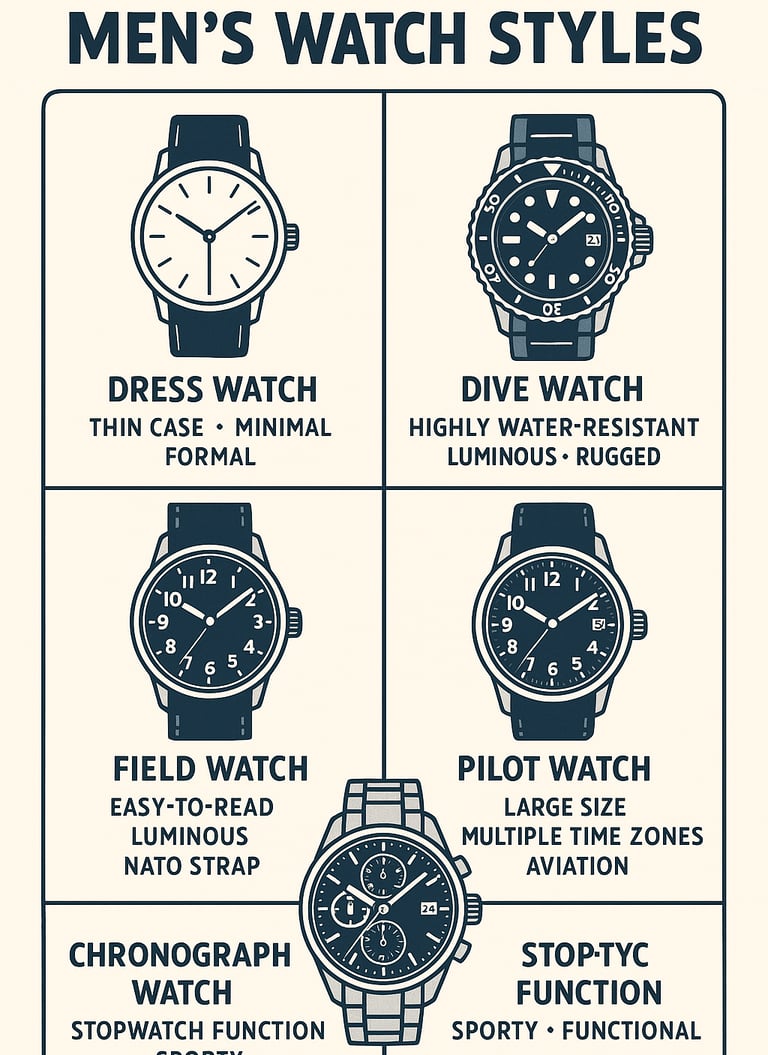Ultimate Men's Watch Guide for Beginners: Top Styles, Features & Buyin
Meta Description: Discover the ultimate Men's Watch Guide for Beginners – learn about watch types, movements, buying tips, and the best starter brands in this detailed guide.
7/10/2025


Ultimate Men's Watch Guide for Beginners: Top Styles, Features & Buying Tips
Introduction to Men's Watches
Watches have been more than just timekeeping devices—they're symbols of style, identity, and personal taste. For centuries, men have used watches not just to track time, but to showcase elegance, status, and functionality. Today, as fashion trends evolve and smartwatches gain popularity, traditional watches remain timeless. If you’re just starting your journey into the world of men’s watches, this guide is your perfect starting point.
Why Every Man Needs a Watch
Wearing a watch is like wearing a signature. It reflects who you are. It also brings practical advantages—like the ease of checking time without pulling out your phone. Moreover, it conveys reliability and attention to detail, essential traits in both personal and professional settings.
Key Benefits of Wearing a Watch:
Style Statement: Matches different outfits and occasions.
Symbol of Discipline: Suggests punctuality and time-consciousness.
Tech-Free Timekeeping: Reduces dependency on phones.
Legacy Piece: Can be passed down as an heirloom.
Understanding Watch Movements
The “movement” is the engine of a watch—it’s what makes the hands move and keeps time accurately. Let’s explore the three main types:
Quartz Movement Watches
Quartz watches are battery-powered and known for their precision. They use an electric current sent through a quartz crystal to create consistent vibrations, which keep the movement accurate.
Pros: Affordable, reliable, low maintenance
Cons: Less craftsmanship appeal
Mechanical Movement Watches
These watches run without batteries, relying on manual winding. Each twist stores energy in a spring that powers the gears.
Pros: Exquisite craftsmanship, often more luxurious
Cons: Requires daily winding, can be pricey
Automatic Movement Watches
A hybrid of mechanical craftsmanship and convenience, automatic watches wind themselves using your wrist’s motion.
Pros: No battery, smooth hand movement
Cons: Can be more expensive, needs regular use or winding
Different Types of Men's Watches
Dress Watches
Designed to be worn with formal attire, dress watches are typically thin, minimal, and elegant.
Dive Watches
Built for underwater use, dive watches are rugged, highly water-resistant, and often feature luminous dials.
Field Watches
These are durable watches originally designed for soldiers—compact, easy to read, and reliable.
Pilot Watches
Inspired by aviation, these watches usually have larger faces, multiple time zones, and a vintage feel.
Chronograph Watches
These timepieces double as stopwatches and are favored for their sporty look and added functionality.
Watch Case Materials and Sizes
Choosing the right case material and size ensures your watch suits your style and fits your wrist comfortably.
Materials: Stainless steel (durable), titanium (lightweight), ceramic (scratch-resistant), gold (luxury)
Sizes:
Small wrists (6-7 inches): 36-40mm case
Medium to large wrists (7-8 inches): 41-44mm case
Extra-large wrists: 45mm+
Watch Straps and Bracelets
Strap type influences comfort and appearance:
Leather: Classy and versatile
Metal (bracelet): Durable and formal
NATO/Nylon: Casual, military-inspired
Rubber: Sporty and waterproof
Tip: Most watches allow interchangeable straps, so you can mix and match!
How to Choose the Right Watch for You
Step-by-Step Tips:
Assess Your Lifestyle – Office, casual, adventure, or all three?
Measure Your Wrist – Ensures proper fit and comfort.
Set a Budget – Decide if you're going entry-level or investing in quality.
Choose Movement Type – Think about convenience vs. heritage.
Pick a Style You’ll Wear Often – Don’t buy it if you won’t wear it.
Entry-Level Watch Brands for Beginners
Seiko
Famous for craftsmanship, especially their automatic watches. Excellent quality at a modest price.
Citizen
Known for Eco-Drive technology—solar-powered watches that never need battery replacements.
Timex
Affordable and stylish, Timex watches offer a wide range of looks with dependable performance.
Casio
From G-Shock to retro digital styles, Casio is ideal for those who want durable, functional watches.
Setting and Maintaining Your Watch
Basic care ensures your watch lasts:
Set Time Correctly: Use the crown carefully, especially on mechanical/automatic watches.
Avoid Water Damage: Know your watch’s water resistance rating.
Clean Regularly: Use a soft cloth; avoid soap and chemicals.
Service Periodically: Mechanical watches may need servicing every 3–5 years.
Common Mistakes Beginners Make
Overpaying for Fashion Brands: Prioritize watchmakers, not just aesthetics.
Choosing the Wrong Size: A watch too big or too small can look awkward.
Ignoring Movement Type: Learn the basics before buying.
Skipping Research: Understand the brand and model you're buying.
Investing in Your First Luxury Watch
If you’re considering a luxury timepiece:
Buy from Authorized Dealers: Avoid counterfeits.
Start with Trusted Brands: Rolex, Omega, Tudor, TAG Heuer
Consider Resale Value: Some models appreciate in value.
Think Long-Term: Choose a watch you’ll still love in 10 years.
Watch Terminology Every Beginner Should Know
TermMeaningBezelRotating ring around the dialCrownKnob used to set time/dateLugsExtensions that hold the strapComplicationAny feature beyond telling timeCrystalTransparent cover over the dialLumeGlow-in-the-dark markers
Frequently Asked Questions (FAQs)
1. What type of watch should a beginner buy?
Start with a quartz or automatic watch from a reputable brand like Seiko, Timex, or Citizen.
2. Are mechanical watches better than quartz?
Not necessarily. Mechanical watches are appreciated for craftsmanship, while quartz offers better accuracy and affordability.
3. Can I wear my watch in the shower?
Only if it has at least 100 meters water resistance. Always check the rating.
4. What size watch should I get?
Measure your wrist—36-40mm for small wrists, 41-44mm for average, and 45mm+ for large wrists.
5. Is it worth buying a used watch?
Yes, if it's from a trusted source and in good condition. You may save significantly.
6. How often should I service my watch?
Quartz watches rarely need servicing. Mechanical watches should be serviced every 3–5 years.
Conclusion: Start Your Watch Journey with Confidence
Choosing your first watch is both exciting and overwhelming—but it doesn’t have to be confusing. With this Men's Watch Guide for Beginners, you now have the tools to make informed decisions, avoid costly mistakes, and find a watch that complements your style and lifestyle. Remember, your watch is more than an accessory—it’s an expression of who you are.



